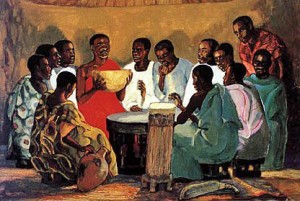Contributed by Scott Moore, Erfurt, Germany
Warm-up Question
What is the first thing you notice about someone else?
Something About the Face
 Both Facebook and the FBI are working very hard to develop current face recognition software to be able to perfectly identify any person with just a picture of their face. Face recognition systems rely on two features in order to be successful: a data base of pictures of faces and biometrics, which are the way a computer measures all the details of someone’s face and turns them into a mathematical algorithm and plots them on a chart in the form of data that can be analyzed and compared. The more pictures the face recognition system has, the greater the chances are the computer can make more accurate comparisons.
Both Facebook and the FBI are working very hard to develop current face recognition software to be able to perfectly identify any person with just a picture of their face. Face recognition systems rely on two features in order to be successful: a data base of pictures of faces and biometrics, which are the way a computer measures all the details of someone’s face and turns them into a mathematical algorithm and plots them on a chart in the form of data that can be analyzed and compared. The more pictures the face recognition system has, the greater the chances are the computer can make more accurate comparisons.
The US government, according to some sources, wants to compile a database large enough to be able to identify every individual in the United States. Facebook, in comparison, is equally interested in growing their database of face prints, but not in order to catch terrorists. Instead, Facebook wants to make the user experience friendlier by being able to identify friends for you tag in your pictures and perhaps even sell information about where you have been and who you were with.
There are groups very concerned about this capture of our identity and its potential abuse. What would it mean if the government could identify us and our whereabouts and our actions at any given time? Even as exciting as some of this technology is, there seems to be something attractive about being able to remain anonymous when we want to. Can we have both?
Discussion Questions
- What is your feeling about face recognition software?
- Where do you think we should draw the line as a society concerning our personal identity?
- Have you ever had biometric data recorded? (ex. Finger prints at borders like at the airport when traveling?)
- Do you spend a lot of time posting lots of pictures (selfies) on various social media sites? Do you know how your images are being used?
Scripture Texts (NRSV) for Sunday, May 4, 2014 (Third Sunday of Easter)
(Text links are to Oremus Bible Browser. Oremus Bible Browser is not affiliated with or supported by the Evangelical Lutheran Church in America. You can find the calendar of readings for Year C at Lectionary Readings.)
For lectionary humor and insight, check the weekly comic Agnus Day.
Gospel Reflection
Jesus has died a horrible death. His followers have been cast into fear and despair. The faithful women who went to the tomb, however, saw a vision of angels claiming that he is not dead. He has been raised. The crucified one is alive. One would think that his followers would be the ones that could recognize Jesus immediately. They’ve watched him and listened to him for years. They have spent days and nights with him. They would know his face anywhere. Yet, Jesus is able to walk up to faithful followers on the road and engage them in conversation without them recognizing who he is. He hears their grief and explains to them by interpreting scripture why all these things were supposed to happen.
As they reached their destination, Jesus starts to head on his way. The disciples offer him hospitality and ask him to stay with them because it is getting dark and dangerous on the road. He agrees and something crazy happens. Instead of them being the host, Jesus takes over the role at the dinner table and does something that he has done before. He takes the bread, blesses it and breaks it, and gives it to them. Take, bless, break, and give. These are the actions of Jesus when he shared the last supper with his disciples. Take, bless, break, share. This is what we do when we gather at the Lord’s table today. Jesus face was hidden from them on the road. In Jesus action at the table they recognize the Lord. As soon, as they see him for who he is, he disappears. They are left with a memory of their entire walk. They see it all clearer now. They felt strong emotions of love and passion on the walk that they now understand, “were not our hearts burning within us?” they say.
This story of a simple walk among friends at a time of grief and pain becomes a model for our Christian walk. Jesus walks with us even when we aren’t able to recognize him. Jesus speaks to us even at our darkest hour even when everything around us tries to drown out his sweet voice. Jesus shares himself with us in holy words and in holy actions even when we find it sometimes difficult to see him in that. Jesus takes a conversation in grief and turns it into joy. Jesus takes simple bread that we have to offer and makes it into a meal where we can see and understand him, and maybe ourselves, in a new light. He blesses our walks through life, our talks about God’s word, and he blesses this meal that he has given to us. It is a gift that is supposed to open our eyes. It is meal that we are called to share in remembrance and recognition of him.
Discussion Questions
- When have you recognized Jesus in the Eucharist/Holy Communion?
- When do you feel more open to sharing in this meal of Holy Communion? When do you find it more difficult?
- When do feel like the Eucharistic meal is a personal meal and when do you feel that it is a community meal?
- In what other meals have you ever recognized Jesus?
- Have you ever felt that your “heart was burning” when you have been talking about the bible with others?
- What do you think your worshiping community could do in order to help everyone recognize Jesus more in this holy meal?
Activity Suggestions
Let’s Find Jesus Meal–Bring food for the participants (donuts, fruit, etc.) Invite them to take some food and either alone or in pairs to find a location within the church/facility where they recognize Jesus. Give them a few minutes to enjoy their meal. Invite them back to share where they ate and why.
Closing Prayer
Lord of Resurrection, you have walked with us along our journey in life. You have encouraged us and given us strength in difficult times and you have rejoiced with us in times of joy. Walk with us and share yourself with us now when we share in your word and when we break bread together. Show us your face and give us the grace to recognize you every step of our lives. We ask this in the name of the one who walks with us always, Jesus Christ, the Risen One. Amen

 Warm-up Question:
Warm-up Question: names: the Lord’s Supper, Holy Communion, Eucharist, just to name a few. Jesus says in the Gospels of Matthew, Mark, and Luke, “take and eat, this is my body… take and drink, this is my blood”. And here in the Gospel of John, Jesus says, “‘Very truly, I tell you, unless you eat the flesh of the Son of Man and drink his blood, you have no life in you. Those who eat my flesh and drink my blood have eternal life, and I will raise them up on the last day; for my flesh is true food and my blood is true drink. Those who eat my flesh and drink my blood abide in me, and I in them.”
names: the Lord’s Supper, Holy Communion, Eucharist, just to name a few. Jesus says in the Gospels of Matthew, Mark, and Luke, “take and eat, this is my body… take and drink, this is my blood”. And here in the Gospel of John, Jesus says, “‘Very truly, I tell you, unless you eat the flesh of the Son of Man and drink his blood, you have no life in you. Those who eat my flesh and drink my blood have eternal life, and I will raise them up on the last day; for my flesh is true food and my blood is true drink. Those who eat my flesh and drink my blood abide in me, and I in them.”